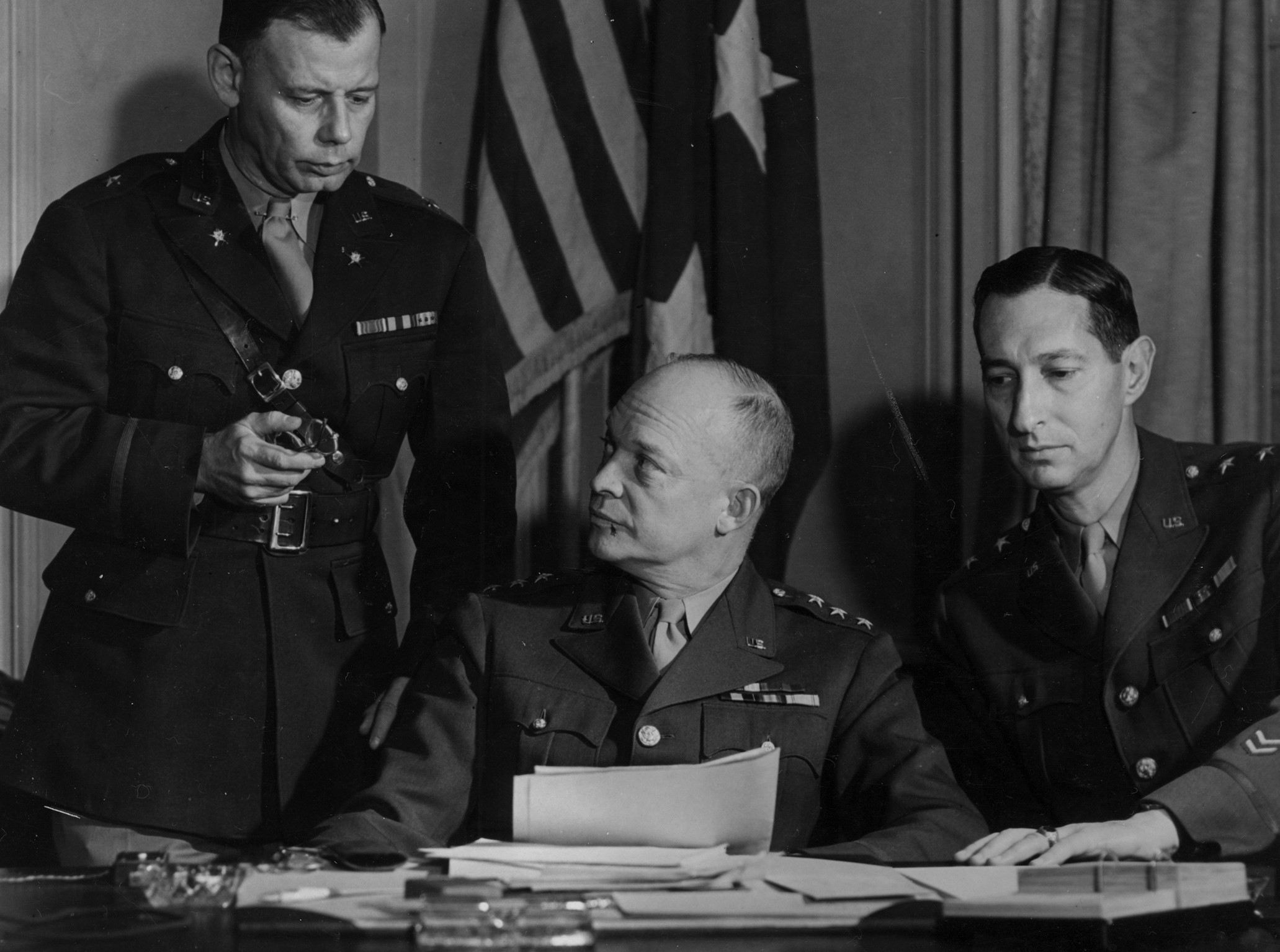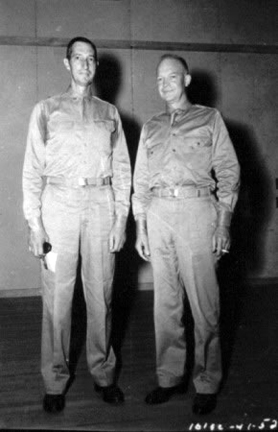A leading World War II commander watched Eisenhower grow from West Point cadet to victorious Supreme Allied Commander.
Editor's Note: General Mark W. Clark was Commander in Chief of U.S. Ground Forces in Europe in 1942. After the war he became chief of U.S. forces in Austria, and from 1952 to 1953 he commanded the United Nations forces in Korea. Here, he tells of his association with Eisenhower at the beginning of the war and the events leading up to Ike's appointment as Commander in Europe.

It was in the period just prior to and following the attack on Pearl Harbor that an old friend and fellow cadet at West Point became recognized as a potentially great military leader. I was in a position to watch this man come into focus as a commander of first rank, and it pleased me very much, for I had seen his qualities of leadership and of heart and soul required to lead men in battle while he was a cadet at the United States Military Academy.
Ike was two years my senior at West Point, but we were in the same company and lived in the same division of barracks. We saw a lot of each other. In the late thirties he was the Chief of Staff for General Douglas MacArthur in the Philippines before returning in 1939 to Fort Lewis, Washington, to take command of a battalion of the 15th Infantry. At that time I was a major and G-3 of the Third Division stationed on the West Coast with its headquarters at Lewis. Here we had another opportunity to be together training troops for combat.
Again I saw his sterling qualities, but of course never foresaw that we would serve so intimately together as we were to do in World War II. No more did I foresee that he would be primarily responsible for the opportunities that were later to come to me.
As the war clouds gathered at the time of Pearl Harbor, our paths separated. I became the Chief of Staff to General Lesley McNair in Washington at G.H.Q., and Ike became the Chief of Staff to General Walter Krueger, commanding the Third Army at San Antonio, Texas. As my job in Washington was directly associated with building of divisions to meet the enemy, I was again in daily touch with Ike, doing the same job for the Third Army.
It soon became increasingly important to give these field commanders a chance to handle large units of troops in the field, and McNair wanted to test the soundness of our logistical doctrines in large-scale maneuvers, where men could sleep and live and work as near as possible under combat conditions. The Louisiana maneuvers were typical of such tests, and Walter Krueger's Third Army was pitted against General Ben Lear's Second Army. Here, Ike Eisenhower had his first opportunity to demonstrate his strategic concepts with a fine plan for making a huge envelopment around Lear's flank in order to get to his rear. It doubtless would have been a great success had we not limited the maneuvers to the state of Louisiana, which ruled out Ike's great plan for his envelopment through Texas.
As McNair's deputy for Louisiana field exercises, I conducted the critiques that followed these problems, and just as I was concluding one of them, an officer handed me a telegram from Washington listing the names of a number of officers who had been nominated by the President for promotion to the grade of brigadier general. I took a quick look at it and noticed Eisenhower's name well up on the list. I took another quick look, and out in front I saw Ike sitting in the first row.
See also: Marshall's Secret Preparations for War, by Paul Dickson
It was too good a chance to miss. I announced to the officers in attendance that I had just received the list of promotions and would read the names. There was a silence as thick as a Turkish rug in the big recreation hall where we were meeting. I read the names, but when I came to Ike's I deliberately skipped it and read all the way through the list before I paused, studied the paper briefly, and added: ". . . and Colonel Dwight D. Eisenhower." He was watching me closely with bright, alert eyes, as if he might have been expecting something of the sort, and as I read his name he dropped one eyelid in a broad, pleased wink. I noticed as the meeting broke up that it was Ike who got the most congratulations.

It was not long afterward that General George Marshall, Army Chief of Staff, came down to observe our field training operations. One evening when we were sitting alone, he told me about certain changes he was making in the staff in Washington. "I wish you would give me a list of ten names of officers you know well and whom you would recommend to be chief of the Operations Division of the War Department General Staff," he said.
"I'll be glad to do that," I replied, "but there would be only one name on the list. If you have to have ten names, I'll just put nine ditto marks below it."
"Who is this officer of whom you think so highly?" he asked.
"Ike Eisenhower," I said.
"I've never met him," Marshall said, but he quickly added that he knew of Ike's brilliant record. Not long thereafter, Eisenhower was ordered to Washington as chief of the War Plans Division and was soon made a major general.
In the months that followed, the parallel nature of our duties kept us in close liaison.
A few months later, in early May of 1942, Ike gave me a ring and said he was flying to England the next day, on Marshall's instructions, to study the situation at first hand.
"Will you go along?" he asked. "We'll be gone about three weeks."
I quickly accepted the invitation and secured McNair's consent.
The next day we flew out of Bolling Field in Washington, and after experiencing delays caused by bad weather over the Atlantic, arrived in Prestwick, Scotland. But flight conditions were so bad that we had to take the night train down to London. We were quartered at Claridge's hotel, and we quickly got down to work, the main result of which was a recommendation by Eisenhower, in which I heartily agreed, that a senior, and experienced, general officer, who was familiar with Washington's new plans for action in Europe, should be sent without delay to command large numbers of U.S. troops, who would soon be flooding the British Isles.
The next most important thing about the trip — or at least the thing that sticks in my mind most firmly — was our meeting with General Bernard L. Montgomery, who was then the general officer in command of the British Army in the southeast of England. This was known early in the war as the Invasion Coast because it was there that the German invasion had been expected for so many months. Monty was then engaged in maneuvers that had the code name of Tiger, a nickname that was often applied to the dapper and hard-driving little general himself in those days. An invitation was extended to Ike and me to observe the maneuvers, and we drove down to Monty's headquarters, where we were shown into a small office lined with war maps to await the arrival of the distinguished soldier.
He came in briskly, was introduced, and promptly began to orient us with a crisp lecture. There were several other officers in the room, and everybody gave his full attention to Montgomery's remarks. After a while, Ike decided he would like to smoke a cigarette. He quietly fished around in his pocket, pulled out a pack, and offered one to me. I declined with a shake of my head, but Ike lighted up. He had taken about two puffs when the lecture broke off in the middle of a sentence. Monty sniffed the air without looking around and in a loud voice asked: "Who's smoking?"
"I am," Ike said meekly.
"I don't," Montgomery said sternly, "permit smoking in my office."
Ike put out his cigarette, and the lecture proceeded. At the conclusion of that first meeting between Ike and Monty, we got a good laugh out of the incident, but not until we were well out of Montgomery's hearing.
A few weeks later we were back in Washington. General Marshall had a meeting with Eisenhower during which he confided to Ike that he was sending him back to England as the supreme American commander. Marshall later sent for me and asked for my recommendation as to who should be the U.S. commander in the British Isles. I promptly replied "Eisenhower." He then informed me that he had already told Ike he would have the command and had asked him whom he wanted as his principal subordinate in command of the II Corps, soon to be sent to England. Ike said, "Clark."
Marshall gazed at me speculatively. "It looks as if you boys got together. How soon can you go?"
On June 23, at 9:10 A.M., Ike, and I again flew out of Bolling Field for our second trip to Europe. It would be several years before we would return, during which time Ike would have demonstrated to the world that he had the qualities to be the victorious Supreme Allied Commander.
